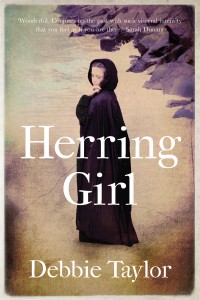 Published by Oneworld Publications 7 August 2014
Published by Oneworld Publications 7 August 2014
465pp, hardback, £16.99
Reviewed by Shirley Whiteside
For her fourth novel, Debbie Taylor takes her inspiration from the converted lighthouse that is her home in the North East of England, and her previous job as a psychologist. Switching between 1898 and 2007, her story encompasses reincarnation, family ties, and finding friendship in the most unusual places.
Ben, who lives in North Shields, at the mouth of the Tyne, is twelve-years-old and has always felt he was born in the wrong body. With puberty beckoning he is becoming increasingly desperate to avoid the changes that will bring. He finds a friend in Laura, a transsexual, who not only gives him tips on how to pass as a girl but also introduces him to Mary, a psychologist who specializes in past life regression. Through sessions with Mary, Ben discovers a past life as Annie, a sixteen-year-old herring girl who lived in the same area more than a hundred years before. But Annie’s life is cut short and Ben’s sceptical father, Paul, must agree to more regression sessions in order to discover Annie’s fate.
Taylor uses the split narrative well and brings a late-Victorian fishing village to life with the vivid sights, sounds and smells of the herring trade. The language is evocative of a very different time and place but meaning is never obscured by the North East dialect. Annie is an appealing heroine, loving her family and not afraid to stand up for herself in her job as a herring girl, processing the fish fresh from the boats. Taylor paints a tough life, especially for women, and the social history, such as how to walk out with a lad without gaining a bad reputation, is fascinating. Annie, the stoic Sam with whom she falls in love, and their friends and family form the heart of the novel and seem more vibrant than their twenty-first-century counterparts.
That is not to say that Ben is not a sympathetic character, nor Mary, the psychologist, who helps him to go back into the past and discover what happened to Annie on that fateful last night. Together they make a formidable investigative team, aided and sometimes hindered by their friends and family. Taylor introduces television director Ian, an old flame of Mary’s, who wants to follow Ben’s sessions for a documentary. Ian is rather a cliché, selfish and self-obsessed, willing to trample over everyone, including Mary, to get his programme made. However he does provide a frame for the regression sessions and asks critical questions about Mary’s theories on reincarnation. Are schizophrenics really just hearing the voices of their past lives? Does Ben want to be female because Annie’s life was cut short before she had the chance to really become a woman? This is an interesting area of psychological exploration and Taylor helpfully provides a list of further reading on reincarnation.
It is not necessary to believe in reincarnation to enjoy Taylor’s story. She writes with such verve and conviction that it is easy to suspend disbelief and enjoy every moment of this gripping tale.
